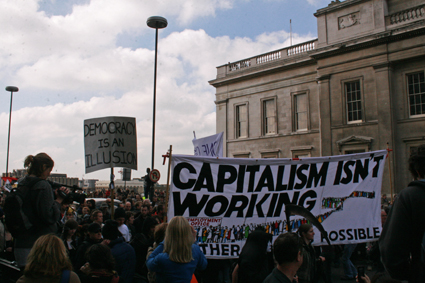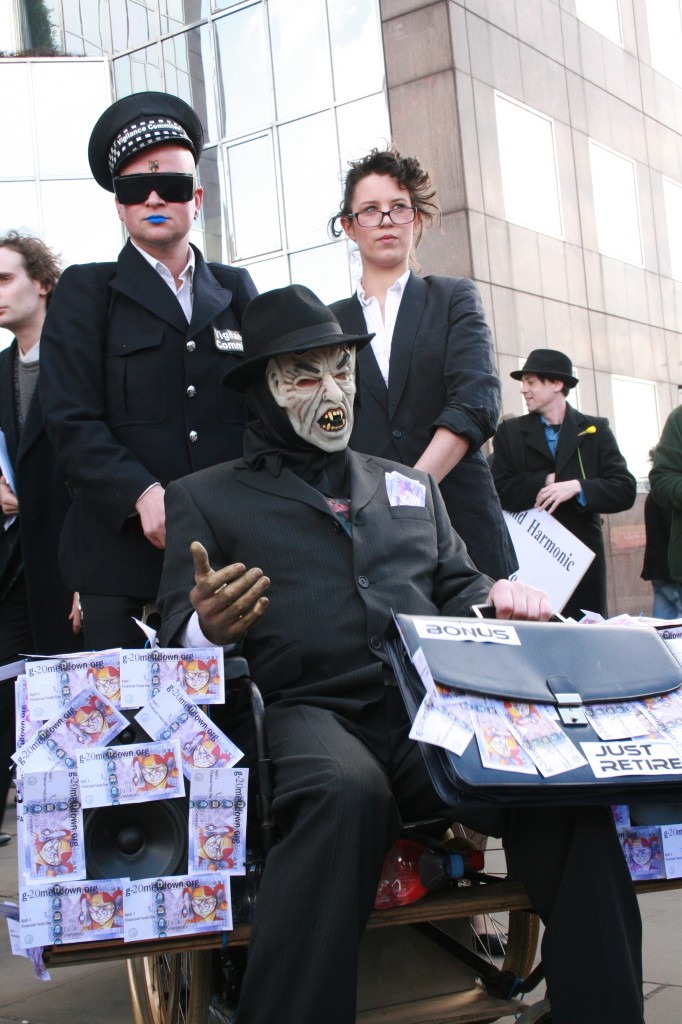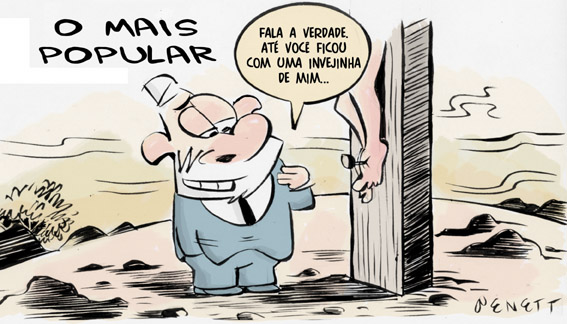“I love this guy. He is the most popular politician on Earth”. Those were US President Barack Obama's words towards the Brazilian President Lula da Silva, and they have intrigued and enchanted the international community, let alone Brazilians. For some, it was an absurd display: is the country doing so well? For others it was a moment that highlighted that the biggest nation in South America has increased its importance among other countries in the last years, and those seconds captured in video have crowned the epic career of the poor guy who was born in the Northeast Brazil and has done a great job as President. According to the Imprensa Marrom (pt) blog:
“Em 2002, o preconceito de boa parte dos brasileiros era muito nítido e o discurso bem treinado: esse presidente semi-analfabeto vai envergonhar o Brasil. Alguns ainda falam isso, com frases como “esse sapo barbudo nunca estudou” e “não se precisa mais estudar no Brasil: o Presidente só fez até a quarta série”.
Mas hoje, Luís Inácio Lula da Silva ouviu, sem dúvida, a frase mais gratificante de sua carreira, que simplesmente quebrou as pernas de todos esses pseudo-argumentos para criticar sua carreira política”.
But today [April the 2nd], Luís Inácio Lula da Silva has no doubt heard the most gratifying phrase of his career, which, simply, has broken the legs of all those pseudo-arguments that criticize his political career”.
“The most popular”. In the speech bubble: “Tell me the truth. Even you were a little bit envious of me…”. Charge by Benett, used with permission
In the family group shot of leaders at the reception with her Majesty the Queen and the Duke of Edinburgh at Buckingham Palace, Lula sat alongside Queen Elizabeth II, in the middle of his counterparts, all of whom together run the most powerful nations on Earth. For other bloggers, the images are the answer to the question about Brazil's position on the planet, as (pt) puts it:
“Trata-se de uma imagem emblemática sobre a nova posição que o Brasil ocupa no mundo, pois até pouco tempo atrás não era tão comum o nosso país participar de reuniões deste porte, muito menos presidente brasileiro sair tão bem na foto, cheio de graça e moral”.
Has Brazil conquered a historical position in the international community with far-reaching results? Has Lula, the former metalworker who, unlike previous Brazilian presidents, does not have an academic background and can speak no English, become a symbol of this new Brazilian status?
Maybe the answers to all the questions above are more likely to be positive, but for Xico Lopes from the Em Pauta blog (pt), the biggest concern over G-20 and Brazil should be the 1 trillion US dollars that leaders promised to pump into the International Monetary Fund (IMF), aiming to help some countries out of the crisis. Brazil made available $10 billion during the G20 Summit and last week agreed to loan up to an extra $4.5 billion to the Fund. Using a mainstream media vehicle as a source, Lopes says:
“Este dinheiro conforme levantamento feito, corresponde a nada mais nada menos do que (a dias de hoje) mais do que o dobro do que já foi disponibilizado para o desenvolvimento. Ou seja, penso que estamos a ver nosso dinheiro, sim, porque os recursos não são dos países, são nossos, gerados pela nossa capacidade de trabalho e poupança, serem desperdiçados, basicamente para cobrir o monumental rombo gerado por banqueiros e investidores gananciosos, inescrupulosos e tentar assim, resgatar a credibilidade em tais instituições.”

Protesters in G-20 Meltdown which took place on London's streets on April 2009, a day before the G20 Summit. Photo: Thiana Biondo
Surprising many, this is the very first time in its history that Brazil is set to lend money to, instead of borrowing from, the Washington based IMF. The country that used to have an external debt in quantities beyond the governments’ political ability to repay now sees things the other way around. “If it doesn't affect our international reserves, we will do so”, said Lula, with the country’s international reserves today boasting over 200 billion dollars.
Some bloggers did not let it go lightly that the IMF is the same institution that used to force Brazil into tightening its belt by controlling the governmental budgets – such as by cutting social expenditure and speeding up privatisation to meet targets – as part of the conditions for getting loans. In 2005, however, Brazil managed to pay off its debt of US$ 15.5 billions to the IMF, and the country has now offered money to the Fund. However, as Jose Correa writes at the collective blog Trezentos (pt), emphasizing that the economy and crisis are more twisted than we think and nothing has changed – the economic order remains the same:
“Mas falo tudo isso só para chamar a atenção para o que andam dizendo pessoas dentro do sistema que parecem entender alguma coisa do que está se passando (Stiglitz, Krugman e Roubini, este conhecido como Dr Destino). Eles parecem concordar que o último grande pacote proposto pelo Mantega do Obama (O secretário do Tesouro, Timothy Geithner, que também já trabalhava pro Bush) é dinheiro do contribuinte jogado pelo ralo. A posição mais dura veio do Joseph Stiglitz. ‘ O que a administração Obama está fazendo é mito pior que a nacionalização: é o capitalismo artificial, a privatização de ganhos e a socialização de perdas. É uma ‘parceria’ em que um parceiro rouba o outro. E essas parcerias – com o setor privado no controle – têm incentivos perversos, piores até que os que nos colocaram na encrenca.
E o Doutor Destino, como é conhecido Nouriel Roubini, diz que tamanha injeção de dinheiro no sistema até pode tirar a economia do buraco (em 2011), mas então a conta terá que começar a ser paga.
Conclusão: apesar de toda a operação de relações públicas do G20, a política econômica do Obama continua sendo a do Bush e o horizonte para o capital continua sombrio
Mas tudo tem seu lado positivo: com a crise, o desmatamento na Amazônia está caindo”.
And Dr. Destiny, as Nouriel Roubini is known, said that such money injection into the system can even rescue the economy from the slump (in 2011), but then this bill will have to be paid.
Conclusion: Despite the incredible operation of the G-20's Public Relations, Obama's economic policy is still the same as Bush's and the horizon for the capital remains gloomy.
But everything has a bright side: with the crisis, the scale of deforestation of the Amazon is decreasing.









2 comments
Parabens for another fine gvo report from Brazil.
I passed it on at my blog: http://lougold.blogspot.com/2009/04/obamas-love-for-lula-well-love-maybe.html
Obrigada, Lou!
Hope that you are having an interesting experience living in Acre.
Best,
Thiana